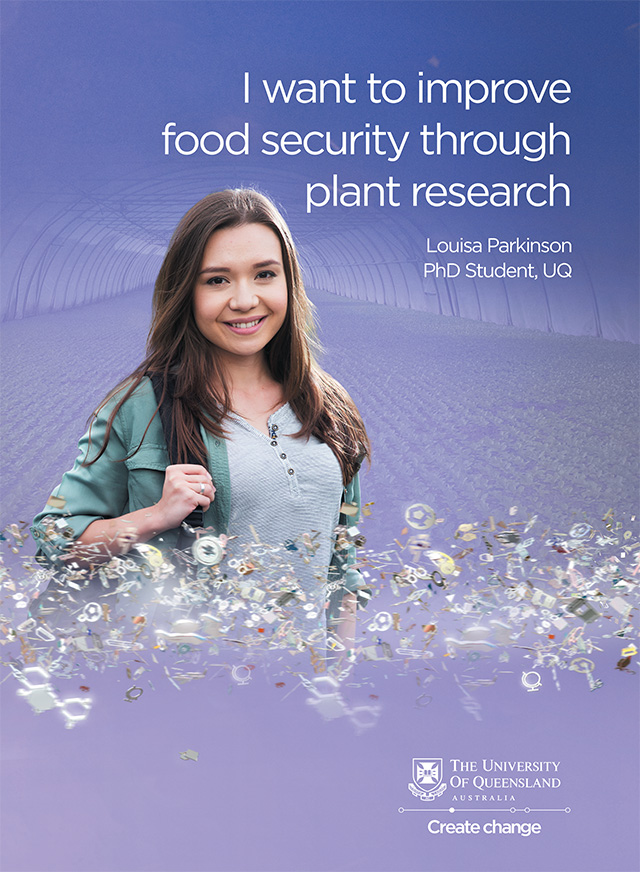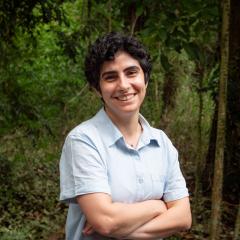
How an avocado researcher became the face of UQ’s advertising campaign
She chose plant science because she wanted to “feed the world”, and now QAAFI PhD student Louisa Parkinson is the face of UQ’s new brand and student recruitment campaign. With its tagline of ‘create change’, the advertising now features across a range of media including television, outdoor and digital.
“I follow UQ on Facebook and saw a post about auditioning for the television commercial, so I sent in a photo,” Ms Parkinson said. A successful audition followed and then Louisa joined other chosen students for filming.
“They filmed part of my featured scene with remote-controlled flying camera drones. Having a floating camera hover in the air in front of me as I stood in front of the Forgan Smith building was an unforgettable experience.
The film crew were 100 metres away and the director was shouting “action,” “cut” and directional cues through a speaker, just like in the movies. They also filmed me up close and with special lighting equipment and the whole film crew standing in front me, watching. It was very exciting, and nervewracking.”
Ms Parkinson said the “create change” branding was appropriate to her story, as her desire to make a difference was what prompted her decision to become a plant scientist and to study avocados.
“By 2050 the world’s population is expected to double, which means we’ll need to produce up to twice the amount of food than we already are,” Ms Parkinson said.
“Plant diseases are a significant threat to food security, reducing yield and negatively impacting global food production. I want to improve food security through plant pathogen research and contribute to helping feed the world,” Ms Parkinson said. Her research focus is black root rot disease of nursery avocado trees, caused by soil-borne fungal pathogens, and its effect on avocado tree mortality during early field establishment.
“My research will provide a better understanding of the causal agents of black root rot in avocado. From fungal DNA sequence data, I am also developing a molecular diagnostic so that we can help avocado growers rapidly test for the presence of these pathogens in their avocados.”
Consumption of avocado in Australia has doubled in the last 10 years, thanks to some clever industry marketing, and the demonstrated health properties. The ancient fruit that once fed dinosaurs is often labelled a “superfood” due to its rich source of potassium, omega-3 fatty acids, and lutein.
Avocados also contain good amounts of soluble and insoluble fibre. In Mexico and Chile, the trade in Hass avocados is so lucrative, the fruit is called oroverde, or green gold. Queensland, with its tropical and subtropical climate similar to the Central American origin of avocado, accounts for the majority of total production. It is estimated that about 60 per cent of avocados produced are sold through supermarkets. Only around 5000 tonnes of fruit is exported overseas.
Ms Parkinson presented her research at the 8th World Avocado Congress in Lima, Peru in September 2015. “I really feel avocado research gives me the best of both worlds – the lifestyle of being involved with agricultural production in Queensland as well as the science. I love talking to growers and being in the field as much as I love being in the laboratory.”
Ms Parkinson, who is of Filipino heritage, grew up enjoying avocados as a dessert fruit. “My favourite avocado recipe is a sweet Filipino dessert made of mashed avocado, mixed with sugar or honey and a splash of evaporated milk. Mum used to make this dessert for me as a child and I still love to eat it.”
Ms Parkinson is supported by an Australian Postgraduate Award and her experimental activities are funded through a project led by her supervisor Dr Elizabeth Dann from Horticulture Innovation Australia Limited, using the avocado levy and funds from the Australian Government.



